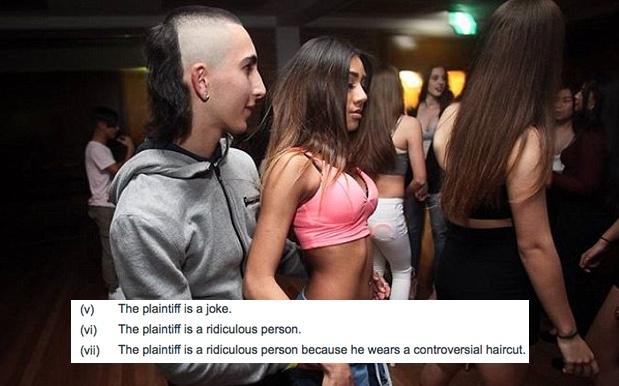Last year, a bloke at a party in Sydney went mildly viral because of his mullet haircut. Mullets are one thing, but this man’s majestic ponytail mullet was the unbelievable stuff of legend. Perhaps it was not ideal that he was splashed on the pages of Aussie tabloids – no one can dispute that – but it’s clear that this would be a potentially tough sell as a defamation case.
[jwplayer qEJdAMqg]
Nevertheless, Ali Ziggi Mosslmani ended up suing the media who posted this story, claiming that they had defamed him. The defendants included the Daily Mail, The Daily Telegraph and the Australian Radio Network. The judge found that the reportage was really quite fine – they weren’t necessarily defaming him, and it was pretty clear the “endless stream of hilarious memes featuring the teenager’s mullet” were about the mullet itself and not the bloke.
You could make a strong case that this is standard practice classism from the good folk at the Daily Tele and the Mail, who are much less likely to rip on the kind of rubbish Richie Rich haircut you’d see on the average Young Liberal shitkicker. But defo is a tough one here, and it’s clear the internet was going wild over the pic.
But Mosslmani’s claims about what the media organisations implied in their claims are really quite wild to the casual observer:
(i) That the plaintiff, by reason of permitting himself to be photographed with a mullet hairstyle, has justifiably exposed himself to ridicule by the defendant.
(ii) That the plaintiff, by reason of permitting himself to be photographed with a mullet hairstyle, has justifiably exposed himself to ridicule by the public.
(iii) That the plaintiff, by reason of his mullet hairstyle, has justifiably exposed himself to ridicule by the defendant.
(iv) That the plaintiff, by reason of his mullet hairstyle, has justifiably exposed himself to ridicule by the public.
(v) The plaintiff is a joke.
(vi) The plaintiff is a ridiculous person.
(vii) The plaintiff is a ridiculous person because he wears a controversial haircut.
Essentially, what Mosslmani is laying out here is what he argues the articles implied through their coverage. The judge didn’t necessarily buy all of this though, which is a setback for his action.
The judge wrote that some of the memes were pretty funny, when it comes down to it – and so were the articles:
These are very short publications which make the point that the plaintiff’s striking mullet haircut has generated a great deal of interest on the Internet, most of it humorous, and some of it in the form of clever observations, such as the “Pythagoras” direction in one of the memes.
They however did claim that some of those above imputations were a little bit excessive and were “overpleaded”.
The statements of claim in all three matters are overpleaded, in that the drafting seems to be designed to claim as many imputations as possible while simultaneously avoiding a defence of honest opinion or justification.
Much of the plaintiff’s original claim was that the articles highlighted ‘ugliness’ on the part of the plaintiff. The judge wasn’t buying that:
As already noted in relation to the photoshopped pictures in the Daily Telegraph article, the closest any such picture gets to suggesting there is anything unattractive (as opposed to ridiculous) in the plaintiff’s appearance is the photograph where a skunk has been added to the plaintiff’s head. However, these photoshopped images need to be viewed in context of the whole of the matter complained of (Charleston v News Group Newspapers Ltd [1995] 2 AC 65). Viewed as a whole the matter complained of is commenting about his hairstyle being ridiculous, and this is not the same as saying that the plaintiff is ugly.
Essentially what all this means is that the statement of claim from the plaintiff was excessive: many of the things he claimed in his original complaint were not valid, or had been overclaimed.
Hence, he was forced to pay the costs of the defendants filing their application, and had to submit another claim without the problematic claims. It can still go in front of a jury. Basically, ridiculing a mullet isn’t in and of itself worthy of a defamation lawsuit, and Mosslmani would have to resubmit on different grounds.
Read the entire judgement
HERE.








